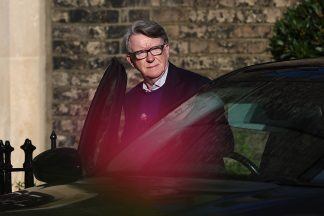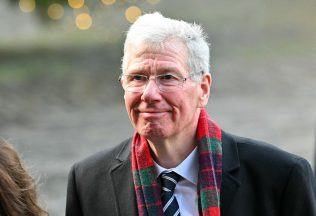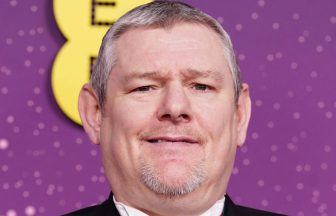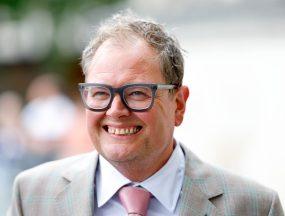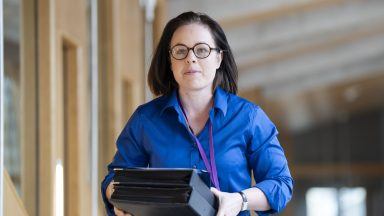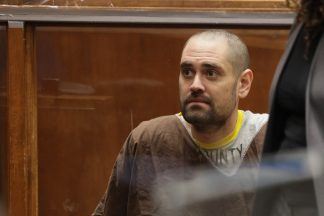The First Minister has claimed she “forgot” about an encounter with Alex Salmond’s former chief of staff in March 2018 in which he mentioned “allegations of a sexual nature” against her predecessor.
Nicola Sturgeon told MSPs she first learned of harassment complaints against the former First Minister when he told her himself at a meeting between the pair on April 2, 2018.
But it later emerged she had met Salmond’s former top adviser Geoff Aberdein four days previously in the Scottish Parliament on March 29.
The First Minister has explained the events in newly-published written evidence to the Holyrood’s Salmond inquiry, while her husband, SNP chief executive Peter Murrell, has also written to the committee.
Mr Murrell said he had “expressed himself poorly” in texts in January 2019 in which he suggested it was a “good time” to pressurise police over Salmond’s criminal case
But he added: “The messages have been presented in a way that suggests a meaning that they do not in reality have.”
Sturgeon was challenged over her husband’s messages in fiery exchanges at last week’s First Minister’s Questions, while she has also been accused of misleading parliament after pledging her government would fully cooperate with the inquiry.
The First Minister insisted she had personally submitted her written evidence months ago and that the committee had not yet chosen to publish it.
The inquiry published Sturgeon’s submission on Wednesday as part of a tranche of new evidence, in which she looks to explain her role in the handling of complaints against Salmond that led to her predecessor successfully suing her government for more than £512,000 in damages.
Salmond was then cleared of sexual offences in a separate and subsequent criminal trial earlier this year.
Sturgeon described how the circumstances had caused her “a great deal of personal anguish” and a “breakdown” in her 30-year friendship with Salmond, but that she had “tried to do the right thing”.
And she refuted “in the strongest possible terms” any idea she conspired against her predecessor, adding: “It seems to me that what some want to present as ‘conspiracy’ is in actual fact my refusal to ‘collude’ or ‘cover up’.”
Included in her evidence is a stream of WhatsApp messages between herself and the former first minister dated from April to July 2018 in which they discuss meetings and aspects of the government’s investigation into Salmond.
The First Minister also sought to outline what she knew and when after her meeting with Mr Aberdein was revealed in the media in July and sparked suggestions then that she had misled MSPs.
Sturgeon wrote: “Alex Salmond told me on April 2, 2018 at a meeting at my home that complaints against him were being investigated under (the Scottish Government’s new complaints) procedure.
“At that meeting, he showed me a copy of the letter he had received outlining the detail of the complaints.
“As has been reported already, four days earlier – March 29, 2018 – I had spoken with Geoff Aberdein (former chief of staff to Alex Salmond) in my office at the Scottish Parliament.
“Mr Aberdein was in parliament to see a former colleague and while there came to see me.
“I had forgotten that this encounter had taken place until I was reminded of it in, I think, late January/early February 2019.”
She added: “For context, I think the meeting took place not long after the weekly session of FMQs and in the midst of a busy day in which I would have been dealing with a multitude of other matters.
“However, from what I recall, the discussion covered the fact that Alex Salmond wanted to see me urgently about a serious matter, and I think it did cover the suggestion that the matter might relate to allegations of a sexual nature.”
The First Minister said her understanding around this time was Salmond was in “a state of considerable distress” and was considering resigning his SNP party membership.
But she insisted: “While I suspected the nature of what he wanted to tell me… it was Alex Salmond who told me on April 2 that he was being investigated under the procedure – and what the detail of the complaints was.
“It is this meeting – due to the nature of the information shared with me at it – that has always been significant in my mind.”
Sturgeon continued: “I suspected the reason Alex Salmond wanted to see me on April 2 was that he was facing an allegation of sexual misconduct.
“Although my contact with Mr Aberdein on March 29, 2018 may have contributed to that suspicion, it was not the only factor.”
She highlighted that in November 2017 she was aware of the SNP receiving an enquiry from Sky News about sexual misconduct claims against Salmond dating back to an alleged incident at Edinburgh Airport in 2008.
Sturgeon stressed Salmond denied the allegations when she spoke to him about it and, given the party had no knowledge of the complainers, there was “no further action” possible to take.
However, the First Minister said “even though he assured me to the contrary, all of the circumstances surrounding this episode left me with a lingering concern that allegations about Mr Salmond could materialise at some stage”.
Sturgeon explained the reasons she had agreed to the April 2 meeting with Salmond despite suspecting what it was about were “both political and personal”.
She went on: “I thought Mr Salmond may be about to resign from the SNP and that, as a result of this or other aspects of how he intended to handle the matter he was dealing with, the party could have been facing a public/media issue that we would require to respond to.”
“There is also the personal aspect,” the FM added.
“Mr Salmond has been closer to me than probably any other person outside my family for the past 30 years, and I was being told he was very upset and wanted to see me personally.”
Despite her suspicions, Sturgeon said she was “shocked and upset by the reality of what I read” during the April 2 meeting at her Glasgow home, when Salmond showed her a letter summarising the complaints against him.
She continued: “He gave me his reaction to the complaints – in the main he denied them, though in relation to one matter he said that he had previously apologised and considered it out of order for it to be raised again – and said that it was his intention to seek a process of mediation between himself and the complainers.
“It was also clear – contrary to what I had anticipated – that he did not intend to resign his party membership or do anything to make the matter public at that stage.
“I made clear to him that I had no role in the process and would not seek to intervene in it.”
The pair spoke again by phone later in April, she said, and she declined an invitation to meet at the end of May.
Then, on June 3, the “tone and content” of a text message he sent Sturgeon led her “to conclude that legal action by Mr Salmond against the Scottish Government was a serious prospect”.
Salmond’s message reveals his lawyers had prepared a draft petition for a judicial review, which he tells Sturgeon he has been advised has “excellent” prospects of success.
“You are perfectly entitled to intervene if it is brought to your attention that there is a risk of your government acting unlawfully in a process of which you had no knowledge,” he told the First Minister.
The Court of Session would go on in January 2019 to rule the Scottish Government’s handling of the complaints against Salmond was “unlawful”, “procedurally unfair” and “tainted with apparent bias”.
Three days after Salmond’s text, on June 6, Sturgeon wrote to the Scottish Government’s top civil servant – permanent secretary Leslie Evans – to make her aware of the situation and the potential for legal action against them.
The day after that, on June 7, the First Minister met her predecessor again in Aberdeen.
Part of the reason she decided to have this meeting was so she wasn’t “cornered” by Salmond at the SNP’s party conference in Aberdeen, she said, which started on June 8.
Sturgeon said she had not seen Salmond since July 14, when the pair had a “third and final” meeting at her home, and had not been in any kind of contact since July 20.
Concluding her submission to the committee, the First Minister wrote: “In what was a very difficult situation – personally, politically and professionally – I tried to do the right thing.
“Whether I always got it absolutely right is something I still reflect on, and the committee will consider, but I sought all along to act in good faith and to strike the right balance of judgment given the difficult issues I was confronted with.
“In the light of the #MeToo movement, I sought to ensure that the Scottish Government developed a process that allowed allegations of sexual harassment – including allegations of a historic nature – to be fully and fairly considered.”
She continued: “For the sake of the complainers, the Scottish Government and indeed Alex Salmond himself, I acted in a way that I judged would best protect the independence and confidentiality of the investigation.
“However, when I became aware of a serious risk of legal action against my
government, I felt I had a duty to make the permanent secretary aware of it.
“My view throughout was that complaints must be properly and fairly considered, no matter who the subject of them might be, or how politically inconvenient the investigations may be.
“And that remains my view, even though the circumstances and consequences of this particular investigation have caused me – and others, in many cases to an even greater extent – a great deal of personal anguish, and resulted in the breakdown of a relationship that had been very important to me, politically and personally, for most of my life.”
‘As many holes as Swiss cheese’
Opposition party MSPs seized on the First Minister’s written evidence as having “as many holes as Swiss cheese”.
Scottish Conservative spokesman on the Salmond inquiry, Murdo Fraser, said: “The SNP’s excuses are incredible and simply beyond belief.
“We are expected to accept that Nicola Sturgeon, the First Minister renowned for her grasp of detail, has the memory of a sieve when she’s told that her mentor of 30 years is facing allegations of sexual misconduct.
“A meeting that would be seared in most people’s memory was immediately forgot all about.
“She then went on to meet with Mr Salmond again and again, on what was clearly government business, all while pretending it was solely about the SNP.
“It’s hard to know what’s more shocking – this evidence, the fact they think we’ll believe this pile of nonsense, or that this is only the tip of the iceberg.”
He added: “It’s now a matter of fact that the First Minister misled parliament.
“She did not find out on April 2 and she did not find out from Alex Salmond.”
Committee member and Scottish Labour deputy leader Jackie Baillie said: “The First Minister’s evidence to this committee raises many questions and could be described as having as many holes as a swiss cheese.
“Despite senior figures in the SNP knowing of the alleged incident at Edinburgh Airport as early as 2008, the First Minister claims to have asked the First Minister about the veracity of the allegations in late 2017.
“Was this because she ignored the allegations at the time or is it because the information had been sat on by other senior figures in the SNP, including her husband?”
Liberal Democrat committee member Alex Cole-Hamilton said the new evidence reveals there was “an offer on the table of independent arbitration which could have helped to resolve the issues at hand with a fraction of the cost and embarrassment that the Scottish Government eventually endured”.
He continued: “Alex Salmond’s messages are clear that his legal advisors considered his case at the judicial review to be a slam dunk.
“Surely that should have been sounding alarm bells in the Scottish Government. Instead they ploughed ahead at huge cost to the taxpayer.”
The Scottish Lib Dem MSP warned Sturgeon her evidence “leaves the committee with more questions than answers” – adding she will face “more detailed questions in person” when called to give oral evidence to the inquiry.
As well as Sturgeon’s submission, the committee also published on Wednesday written evidence from deputy FM John Swinney, advisers Liz Lloyd and Duncan Hamilton – and from SNP chief Mr Murrell.
The party chief executive, who married Sturgeon in 2010 when she was deputy first minister, said he wished he had “expressed myself more appropriately” concerning text messages about Salmond.
The messages, sent after the former SNP leader had been charged with various offences in January 2019, suggested it was “good time to be pressurising” police over the case, and that the “more fronts” the former First Minister is “having to firefight on the better”.
Writing to MSPs, Mr Murrell said: “The messages were sent the day after Mr Salmond had been charged with a number of serious offences.
“In the aftermath of this, the SNP was contacted by individuals who had specific, personal questions in relation to that criminal case.
“My intention was to advise that their questions should be addressed to the police and not the SNP.
“I acknowledge that I did not express myself well but I suggest that in the context of such a criminal case, directing people to the police was the only responsible thing to advise.”
He continued: “In relation to the second message, this has been presented as following on immediately from the first. That is inaccurate.
“However, my intended meaning was that any and all complaints should be appropriately investigated.
“The tone of it is a reflection of the shock, hurt and upset that I, and so many others in the SNP, felt that day given the events that had unfolded in court the previous day.
“As most people will appreciate, the immediacy of text messages lend themselves to informal, shorthand forms of expression but, even so, I would wish on reflection to have expressed myself more appropriately.”
Follow STV News on WhatsApp
Scan the QR code on your mobile device for all the latest news from around the country




